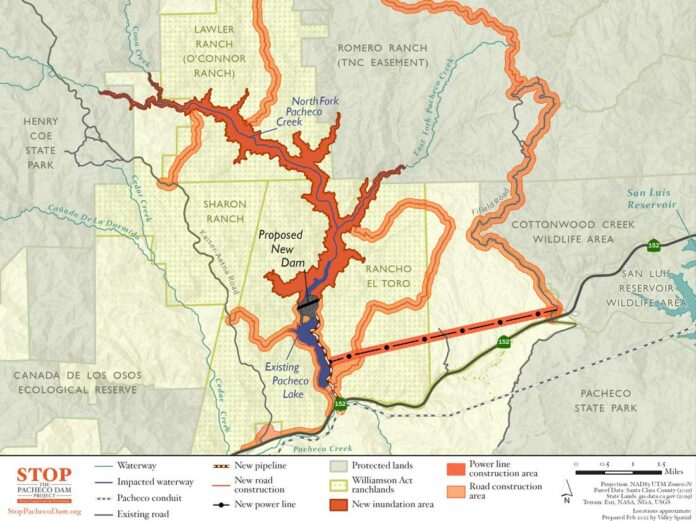
Plans to build a new dam for Pacheco Reservoir in southeast Santa Clara County are on hold after a superior court judge in May ruled that the project developer had incorrectly claimed it is exempt from state environmental laws.
Santa Clara County Superior Court Judge Theodore Zayner on May 18 ruled that the project applicant, the Santa Clara Valley Water District, had filed a “notice of exemption” that was not in compliance with the California Environmental Quality Act. The ruling was issued in response to a lawsuit filed in June 2022 by Stop the Pacheco Dam Project Coalition, and later amended to include the Amah Mutsun Tribal Band and the Sierra Club.
Valley Water has proposed building a larger dam that would expand Pacheco Reservoir’s water storage capacity from 5,500 to 140,000 acre feet. The project is intended to safeguard the valley’s long-term water supply capacity, improve water quality, benefit the ecosystem and create new habitat for an endangered steelhead fish species, according to Valley Water.
The district in 2019 completed an environmental impact report for an initial phase of the project. Under CEQA, a project applicant must either conduct an environmental review or determine that the project is exempt from such a review.
The lawsuit filed in 2022 argued that the project’s “Phase 2 Geotechnical Investigations” for the Pacheco Dam plans did not comply with CEQA because Valley Water improperly claimed it was exempt, according to court filings.
Zayner’s ruling says the project is not exempt from a CEQA review. The ruling describes the extensive earth-moving work that is proposed in phase 2 of the Pacheco Dam project, and explains it is difficult to assume that such processes would not disturb the environment.
“The project activities, the planned digging of at least 200 geotechnical borings…using backhoes/excavators to dig up to 57 test pits (each of which will measure 10 to 20 feet long…and up to 20 feet deep) and the removal of 32 trees cannot be reasonably construed as not causing ‘serious’ or ‘major’ disturbance to at least one environmental resource,” says the May 18 ruling. “Just digging (a) handful of ‘test pits’ in ‘wetland’ areas…appears to the court to constitute ‘serious’ disturbance to wetland.”
The judge’s ruling added, “Petitioners also raise valid point that the helicopter flights the project calls for to move material into place may constitute ‘serious’ disturbance to wildlife and there is evidence in the record suggesting this may have already occurred.”
Now, the judge’s ruling suggests, Valley Water must complete an EIR for phase 2 before proceeding. In a statement, Valley Water noted that the Pacheco Dam project—which has been in the pre-planning stages for several years—would assist with flood prevention and safety efforts, by reducing flood risks along Pacheco Creek and the downstream Pacheco River.
The district is weighing its options in light of the May 18 ruling.
“We take this court opinion seriously and are evaluating our next steps,” said Valley Water Acting Deputy Operating Officer Ryan McCarter. “Valley Water’s staff and consultants will continue working on the Pacheco project’s design, environmental assessment and financial feasibility. Valley Water will also continue to work with regulatory agencies and engage with community stakeholders on this project.”
Pacheco Reservoir is located in southeast Santa Clara County, about 13 miles southwest of San Luis Reservoir off Highway 152.
Valley Water had previously secured about $484 million from the California Water Commission for the project, whose estimated total cost was about $1 billion in 2019. That cost has ballooned to about $2.9 billion, according to a press release from Stop the Pacheco Dam Coalition.
The coalition touted the May 18 ruling as a victory for the environment and taxpayers.
“This court ruling is a significant victory for environmental and cultural resources protection and accountability, and shows that Valley Water cannot be trusted to correctly review and mitigate the impacts of this destructive new dam project,” said Osha Meserve, the coalition’s attorney. “This project is not worthy of public funding, whether it be from the California Proposition 1 Water Bond or the U.S. Environmental Protection Agency WIFIA program.”
Valentin Lopez, chair of the Amah Mutsun Land Trust, added that the May 18 ruling helps protect tribal resources in the area of the Pacheco Dam project.
“We are gratified that the court appreciates the seriousness of the proposed land disturbances and is requiring proper environmental review,” Lopez said in the coalition’s press release. “Our tribe seeks to prevent the irreparable destructive impacts of the dam project and these investigation efforts, which would harm cultural, sacred and ceremonial sites that are documented in the area.”
The Stop the Pacheco Dam Coalition was formed “to protect the unique biological, cultural and other resources of the Diablo Range, and Santa Clara County ratepayers,” adds the press release.
Valley Water’s statement noted that the Pacheco Dam project is part of the district’s “all-of-the-above climate resilience solution which includes conservation, advance purified water, surface storage, groundwater recharge, stormwater capture and more.”









